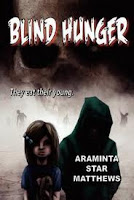 Kids save the world from their undead parents! This mind-blowing premise is the idea behind Araminta Star Matthew's YA novel Blind Hunger. I'm delighted to have her as my guest today. I asked her to talk about character development in her work.
Kids save the world from their undead parents! This mind-blowing premise is the idea behind Araminta Star Matthew's YA novel Blind Hunger. I'm delighted to have her as my guest today. I asked her to talk about character development in her work.* * *
First off, let me thank Anne for asking me to be a guest blogger. Thanks, Anne! My writing process for Blind Hunger played out very differently than it has for other novels and short stories I’ve written. First off, the story was originally a NaNoWriMo (National Novel Writing Month) winner a few years back, so I whipped the original draft out in just thirty days. It took another two months to finish the first draft, then a full year of editing before I felt it was tidy enough to submit to a publisher. Normally, my process is very different: I write and plan as I go, adding details and revising/refining my words for months at a time, then allowing my manuscript to sit for a while collecting dust before I start on it again.
You asked how I’m able to write compelling and believable characters, and thanks for that. That’s quite a compliment. I think that’s about the one place my training as a classic literary novelist comes into play. I have both an undergraduate and graduate degree in creative writing which prepares you to write the next Gatsby, not the next Carrie, if you know what I mean. While I wouldn’t say Blind Hunger is very literary (that is, a story driven by characters and not plot), I would argue that my characters certainly benefited from all that classic training. As a result, they’re three-dimensional with unique personalities. I owe this to an insatiable curiosity and study in psychology and sociology: you have to know what makes a person tick (or what might make a person tick) in order to write that person in a believable way. For example, I’ve never been a teenage boy with abusive parents—far from it; my parents were mostly loving and supportive. So, to create the characters for this novel, I actually drew on my theatrical background—a skill riddled with psychology and sociology--to bring them to life. I literally would sit at my computer and tense up my shoulders, or start gasping for breath, trying to find the right way—the angle—in which my individual characters would react to a given moment.
Their idiosyncrasies required a little more research. I spent time with some local teenagers, asked questions of my students (I teach college writing) about what kind of music the Emo or Goth kids listened to when they were still in high school, and I watched a lot of film and television adaptations of youth culture. Then, when I was sitting at the keyboard entering their personalities into the ether of my hard drive, I would add to my list of theatrical actions whatever I gleaned from that study. Then I was punching away at my keyboard with black nail polish on, or I was playing with this chemistry set my mother got me for my birthday (yes—she still buys me children’s toys, and I love it). It was a good time.
Acting out scenes and characters was kind of a reverse literature lesson for me. In a literature class, I would task my students with pulling out what was important in a scene or amidst a stack of character dialogue in order to write little scripts to play out in class. In this sense, I flipped it. I now acted out scenes before I wrote them down. It allowed me to achieve stronger sensory details if I was, for instance, tensing my own shoulders or gasping in the way my characters were; and, it also helped me to identify what really mattered—that is, what I really needed to show in a given scene.
* * *

What an in depth process! I love it! Will have to remember this...
ReplyDeleteI think writing believable characters is the utmost important skill any writer should have or ... practise on being really good at. I like how Araminta describes her process of delving into her character's psyche. (She's got me thinking about getting a degree in psychology ...)
ReplyDeleteI love acting out scenes. I'm so glad to see others doing this, too.
ReplyDeleteAw, you don't need a degree in psychology. Just, maybe, a healthy interest and a few books or classes.
ReplyDeleteI enjoyed hearing about how you drew on so many of your past experiences in writing this book. As well as tapping into the culture of the youth in your classes. Very cool.
ReplyDelete